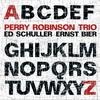| |
There are always two sides to every story in life, and sometimes even more than that. The encyclopedic title of this album, for instance, suggests an ambition that seems impossible to live up to. At the same time, though, the undertaking it implies is an absolutely necessary one. The reason is identical in both cases: “Perry Robinson is one of the most important clarinetists alive today and one of the few players to take this instrument into the twenty-first century.” (Florence Wetzel: P. Robinson: The Traveller) ... [more]
 Cover: K.Untiet, B.Göge Cover: K.Untiet, B.Göge
Perry Robinson - clarinet
Ed Schuller - bass
Ernst Bier - drums, percussion
| 1. |
Sooner Then Before |
E. Schuller |
|
5:07 |
| 2. |
Loose Nuts |
G.Robinson |
|
5:13 |
| 3. |
Unisphere |
P.Robinson |
|
4:18 |
| 4. |
Funky Giora |
P.Robinson |
|
5:53 |
| 5. |
Joe Hill |
E.Robinson |
|
6:04 |
| 6. |
Switchbacks |
G.Robinson |
|
7:45 |
| 7. |
A.K.A. Snake |
E. Schuller |
|
5:52 |
| 8. |
Mountain Soup |
P.Robinson |
|
6:53 |
| 9. |
From A to Z |
E. Schuller |
|
5:30 |
Recorded at Fattoria Musica November 25, 2008
Recorded by Stephan van Wylick -www.fattoriamusica.de
Mixed and Mastered by Stefan Weeke
Executive Producer: Uli Blobel
Photos by Dominik Heer
Artwork: K.Untiet, B.Göge
Ernst Bier plays Pommerenke Drums - www.schlagzeugbetreuung.de
Order this CD at............

Linernotes
Perry Robinson Trio - From A To Z
There are always two sides to every story in life, and sometimes even more than that. The encyclopedic title of this album, for instance, suggests an ambition that seems impossible to live up to. At the same time, though, the undertaking it implies is an absolutely necessary one. The reason is identical in both cases: “Perry Robinson is one of the most important clarinetists alive today and one of the few players to take this instrument into the twenty-first century.” (Florence Wetzel: P. Robinson: The Traveller)
Since his debut on “Funk Dumpling” in 1962 (with Kenny Barron on piano, Henry Grimes on bass, and Paul Motian on drums), Robinson has released only a few handfuls of albums under his own name. His discography adds about forty recordings, on which he played for leaders as diverse as Archie Shepp and Dave Brubeck; as a member of Charlie Haden’s Liberation Music Orchestra and Gunter Hampel’s Galaxie Dream Band; with the Licorice Factory (his own band that consisted of up to seven clarinets of all sizes); with Klezmokum; and, last but not least, as a studio musician for Pete Seeger and Allen Ginsberg. Incomplete as it is, even this brief selection from the alphabetized list is almost too large to come to grips with. At the same time, it is barely sufficient to describe the breadth of Perry Robinson’s horizon. The good news is that it’s all there in his music.
“You have always created everything in your whole world by yourself. You love to play, you love to fight, and most of all you love to tear up the old and turn it into something new. And what you love even more is to take totally destroyed remnants and use them to create something.” Perry Robinson was seven years old when he received this encouraging letter from Woody Guthrie, a friend of his father’s. Perry’s early childhood memories include visits to Hollywood film studios (where Earl Robinson worked as a film composer) and trips to picketed factories where the family mingled with the demonstrators. For Joe Hill, Robinson is like an older brother. His father composed the anthem of the American workers’ movement two years before Perry was born.
Much has been written about the expressive power of the clarinet and the similarity of its sound to the human voice. It is this quality that predestined the clarinet to become the main instrument of early jazz and of the exuberant music of the Klezmorim before the more powerful saxophone rose to predominance in both genres. And Klezmer, like jazz and folk music, is naturally one of the sources from which Perry Robinson draws his musical inspiration. His other sources include the classical avant-garde, whose protagonists were in exile on the west coast of the USA while he was a child. “Hearing Schönberg so early in my life was important for my free music later on,” Robinson recalls. “My first clarinet teacher played Schönberg. He made recordings of it and gave them to my father. I absolutely immersed myself in it.”
Archie Shepp said, “The clarinet is a wonderful instrument and I am proud of the contributions of black Americans to the versatile development of its sound. Perry Robinson (who, by the way, isn’t black) has been one of my favorite clarinetists ever since I first heard him at the World Youth Festival in 1962. His immeasurable ability inspired me to invite him to the recordings...” (Archie Shepp: Liner Notes zu Mama Too Tight, 1966)
Perry Robinson is a musician’s musician. He has been one of the most productive protagonists of the jazz scene for over half a century, and his creativity is still in demand internationally. If the public at large is less aware of his name than of his colleagues Ornette Coleman and Carla Bley, the reason may be that his instrument, the clarinet, is associated with the heyday of Benny Goodman, the king of swing. But Robinson’s roots run far deeper. They reach back into folk and blues, the ground water of American music, and to a time long before the division into oldtime vs. avant-garde and black vs. white. This is the basis out of which, over the decades, a mighty trunk grew up and put out a crown of widely spreading branches. In other words, Perry Robinson tells living stories in that most universal of languages, music. From A to Z.
The same applies to his colleagues in the Perry Robinson Trio. Ed Schuller, who studied bass, music theory, and clarinet, and Ernst Bier, a truly empathetic percussionist, have been Robinson’s partners in animated (and animating) musical dialogue since 1984. “What influenced me most was Perry’s aura and his way of dealing with things,” says Schuller “We talk about all sorts of things, from string theory to the philosophical meaning of God. Being around people like that keeps the juices flowing. Perry awakens the natural creativity within you. Not by forcing you to do anything – just by being there. If you think about it in terms of Arthurian legend, Perry would be Merlin the enchanter. Merlin had all the power, but he always remained in the background. He never fought a war, he just came by occasionally and did something. That’s what Perry’s like. He doesn’t lead his men into battle, but he’s there – and things develop the way he wants them to.”
Tobias Richtsteig
Press
JazzTimes April 2011 by Lloyd Sachs
Even by clarinet standards, Perry Robinson’s From A to Z is one of the airiest of albums, a set defined by the leader’s unerringly light touch and surpassing sense of spatiality within the confines of his excellent longstanding trio with bassist Ed Schuller and drummer Ernst Bier. There’s an organic, Zen-like quality to the music, whether it takes the form of the nimble, Ornette-ish melody of “Sooner Than Before”; the playful, refracted klezmer of “Funky Giora”; or the paradoxically mournful and hopeful tones of the title track.
A cult hero who has flown under the radar of popular recognition for five decades, Robinson is valued by critics and aficionados as a supreme stylist, and is recognized as an innovator who helped introduce modern jazz to his instrument; he effectively paved the way for edgy reedists like Don Byron and Ben Goldberg. As revealed by a spooky rendition of “Joe Hill,” a labor anthem written by his film composer father Earl Robinson, his playing is also informed by modern folk. (Robinson once played with Pete Seeger and Allen Ginsberg.)
Robinson’s performance on From A to Z is more contained than his fabulous turn a decade ago on the William Parker Clarinet Trio’s Bob’s Pink Cadillac. But both albums are lifted by his deep internal gaze and ability to make each note count. Schuller’s self-accompanying vocalizations here are not for everyone’s taste, but the album overcomes them with its ingenuity and radiant warmth.
JAZZIZ Spring2011 by Ed Hazell
It's clear from Ernst Bier's drum introduction to “Sooner Then Before," with its bouncing beat and percolating accents, that listeners are in for a joyful time with Perry Robinson's trio. The veteran clarinetist, one of the most benign and idiosyncratic voices to emerge from the cauldron of '60s free jazz, is full of gentle quirks and sly ideas. He plays with a chamois-soft tone and sticks to the middle register, producing solos that are more insinuating than assaulting. And his grasp of folk and blues music solidly grounds his freer moments.
Nevertheless, Robinson is full of surprises. On “Loose Nuts," laughing phrases and gentle taunts punctuate longer burbling lines. On the klezmer-inflected “Funky Giora," his irregular phrases bolt over the bar lines one instant, then pull up short to form little tickling licks. “Joe Hill" features some eerie deconstruction of the familiar folk melody before swinging into an affirmative melodic solo that displays Robinson's affection for the idiom. Turns out Woody Guthrie was a friend of the clarinetist's father, film composer Earl Robinson, who wrote “Joe Hill" as a workers' anthem in the 1930s.
Bassist Ed Schuller has been collaborating with Robinson for more than 25 years and shares solo space equally with the trio's nominal leader. Perfectly attuned to Robinson's distinctive approach, Schuller embodies both its lyricism and freedom. Bier, another colleague of more than two decades, is a supportive accompanist who helps the music breathe and swing without an undue amount of clutter. A delightful trip from beginning to end.
The Guardian, July 2010 by John Fordham
Some recordings are so unabashedly about the idiosyncrasies of the improvisers, specific references and the simplicity of the session that it's hard to see anyone but the faithful getting the point. This set, featuring clarinettist Perry Robinson (one of the few modern-jazz practitioners of his instrument) might suggest that at first. Yet Robinson is a broadminded performer with klezmer and folk music associations (he's also worked with Pete Seeger), whose work is remarkably accessible. Bassist Ed Schuller's Sooner Than Before has much of Ornette Coleman's stop-start mischievousness and eruptions of boiling swing (Schuller also sings in his bass solos, but it's very musical and irritation-free). There's a delicious exercise in clarinet tone-control of a bass drone on Funky Giora (which starts with a purr but eventually develops a klezmer bounce). A song about the early 20th-century labour activist Joe Hill starts improv-abstract and turns into something close to a New Orleans strut. It all feels as if you are eavesdropping on three musicians having a whale of a time doing what they do best.
|
|




